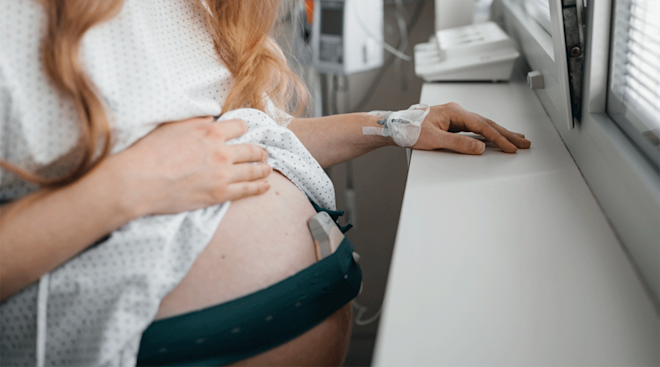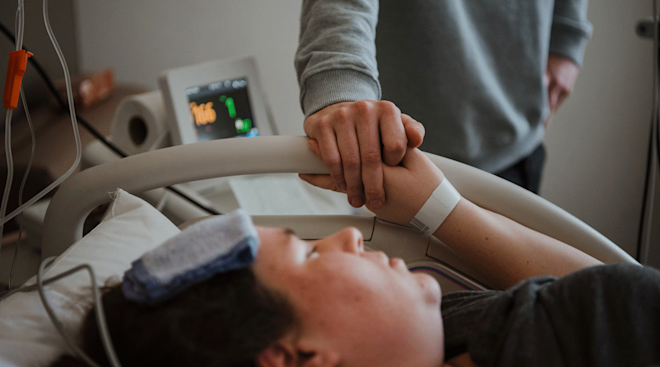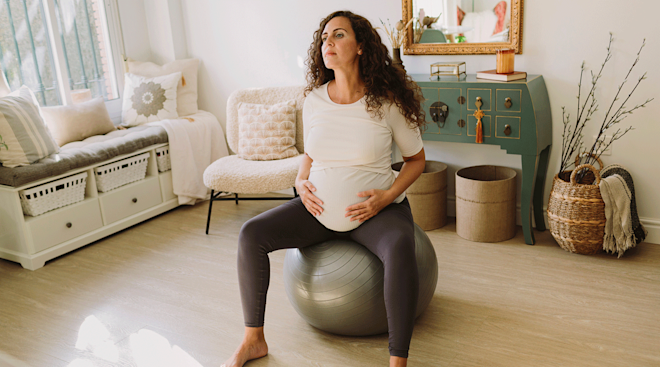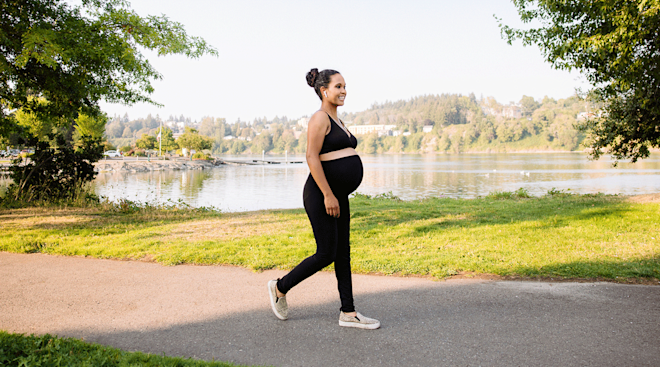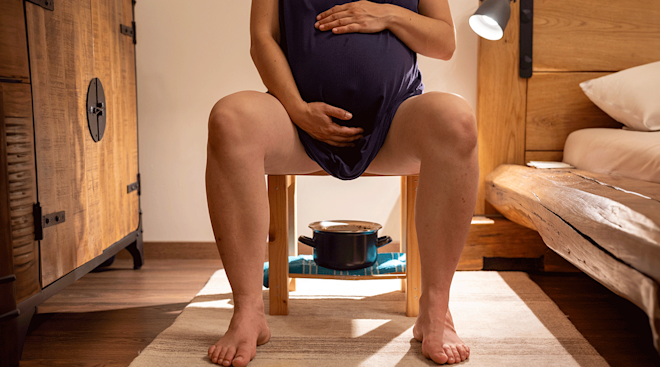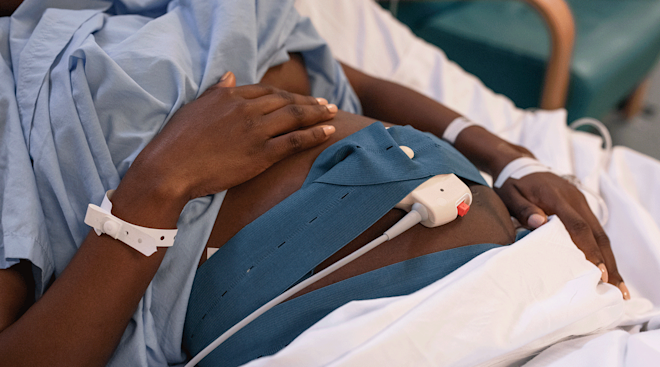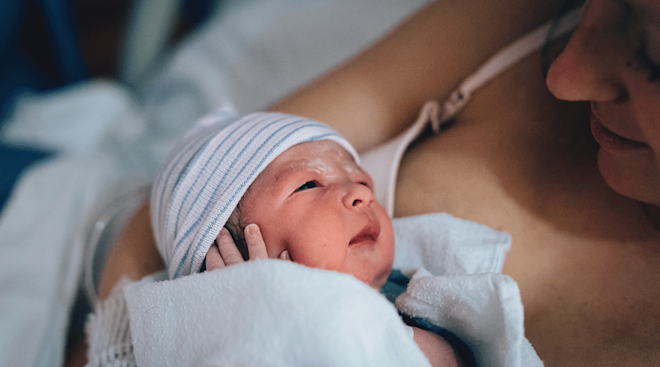Why Doctors Give Babies a Vitamin K Shot at Birth
There’s a checklist of things that will happen right after baby is born. Your care team will cut the umbilical cord, check baby’s vitals and put that sweet little newbie on your chest for some skin-to-skin action. One more important early to-do on the agenda? A vitamin K shot.
Vitamin K is an essential nutrient that babies (and kids and adults!) need in order to make blood clots to stop bleeding and support bone health. But babies are born with essentially zero vitamin K in their tiny systems, which puts them at risk for a dangerous bleeding condition. Fortunately, a vitamin K shot at birth supplies your little one with all the vitamin K they need in the first six months of life—which is why it’s universally delivered on day one. Feeling a little nervous about baby’s first shot? It’s normal to be wary, but this injection is too important to skip or delay. Read on to learn why.
The vitamin K shot is an injection given to newborns shortly after birth to prevent vitamin K deficiency bleeding (VKDB), a serious and potentially fatal condition. According to the Centers for Disease Control and Prevention (CDC), the vitamin K shot works to keep baby’s levels of the nutrient where they need to be now and later. Some of the vitamin in the shot travels to baby’s bloodstream to provide an immediate boost of K that will last for a couple of days; the rest gets stored by the liver and is slowly released over the next few months. This stock of K ensures that baby has enough to last until they’re able to get the vitamin from food sources when they start solids around the six-month mark.
The idea of giving your sweet newborn a shot as soon as they come into the world might seem a little harsh. But, in this case, it’s crucial. “The benefits of vitamin K administration are huge and life-saving,” says Rebekah Diamond, MD, assistant professor of pediatrics at Columbia University Irving Medical Center in New York and author of Parent Like a Pediatrician.
Babies are vitamin K deficient at birth, explains Angela Carol Mix, DO, a pediatrician with Texas Health in Plano. Regardless of how much vitamin K you’ve consumed during pregnancy, your newborn’s levels of the nutrient are practically depleted, explains the American Academy of Pediatrics (AAP). Newborns also have immature guts and haven’t yet built up the bacterial colony necessary to naturally produce more of the vitamin.
Ultra-low levels of vitamin K put newborns and young babies at risk for VKDB. With this condition, the body is unable to make clots and thus can’t stop bleeding. This causes dangerous internal bleeding in the organs that requires surgery or blood transfusions. According to the AAP, about half of all babies with VKDB develop bleeding in the brain, which can lead to severe brain damage and even death. What’s more, the CDC notes that one in every five babies with VKDB dies.
VKDB is most common in the first week of life, affecting as many as 1 in 60 newborns who don’t receive a vitamin K shot at birth. But a version of the condition, called late-onset VKDB, can occur at any point before baby reaches the six-month mark. Babies who don’t get a vitamin K shot at birth are up to 81 times more likely to be affected compared with those who do, according to the AAP.
The good news? After receiving a vitamin K shot at birth, a baby’s chances of developing VKDB are practically nonexistent. “The vitamin K shot is extremely effective at preventing VKDB,” says Diamond. “With universal vitamin K administration, we have been able to almost completely eradicate this terrible and deadly disease.”
Don’t worry; baby doesn’t need the shot the very second they’re born. You’ll still be able to snuggle your little one for a bit and squeeze in that all-important first feeding. The CDC recommends that the vitamin K shot be administered within six hours of birth—so there’s no imminent rush.
That said, you don’t want to wait too long; holding off to see if baby shows actual signs of a deficiency is a seriously dangerous gamble. There’s no way to tell ahead of time whether a baby may develop VKDB, and bleeding in places like the intestines or the brain can go undetected until a baby is experiencing life-threatening symptoms like seizures or vomiting blood, notes the Cleveland Clinic. “If you wait, it’s too late,” Mix says. “A baby will already have a high risk of dying or developing severe complications like cerebral palsy or stroke.”
The CDC and AAP both say that the vitamin K shot is safe. “All infants should get a vitamin K shot,” Diamond says. “It’s really okay to just say yes and not spend any time worrying or agonizing about it.”
You might’ve come across internet chatter about a study in the 1990s that demonstrated a possible link between the vitamin K shot and leukemia. But no study since then (and there have been many) has replicated those findings. What’s more, a 2022 paper published by the AAP reiterates that there’s no credible evidence tying the vitamin K shot to leukemia.
Pediatricians agree. “There are zero safety concerns,” Mix says. “We give vitamin K shots all the time. If they caused cancer, you’d see correlating increased cancer rates.”
Vitamin K shot ingredients
The main ingredient in the vitamin K shot is—you guessed it—vitamin K. According to the AAP, the standard dose, which is given to newborns weighing over 3.3 pounds, is 1 mg. Preemies born weighing less than 3.3 pounds receive between 0.3 and 0.5 mg depending on their weight.
Many vitamin K shots also contain benzyl alcohol, a preservative commonly used in tiny quantities to keep medications stable. Small amounts of benzyl alcohol in shots are safe, and there’s no evidence that the preservative is harmful to infants, according to the March 2022 paper published by the AAP.
If you have concerns about benzyl alcohol, talk with your doctor or care team. Some hospitals offer preservative-free versions of the shot for newborns. “If it’s something you’re interested in, you could ask the hospital about it ahead of time,” Mix says.
Possible vitamin K shot side effects
It’s possible for newborns to have some slight swelling or bruising at the site of the injection, but overall vitamin K shot side effects are pretty mild. Serious adverse events are incredibly rare. A handful of babies have had scarring at the injection site, and there has been one (truly, one) report of a baby having an allergic reaction to the shot, according to the CDC.
And, yes, the pinch of the needle may make baby uncomfortable for a minute, but you can help your little one get through with lots of cuddling. You can rest assured too that they’ll forget about the whole experience within a matter of minutes, Diamond says.
There are no alternatives that are as effective at reducing the risk for VKDB as the vitamin K shot. Research has found that oral vitamin K doesn’t prevent VKDB as well as the injection, since babies can’t absorb an oral dose as well. “There are higher rates of fatal and life-threatening bleeding when oral vitamin K is used,” Diamond says.
As for supplementing with vitamin K during pregnancy or while breastfeeding? It’s probably fine to do so as an extra form of insurance, but neither will prevent VKDB, and you shouldn’t supplement in lieu of giving baby the shot, says the AAP. “If a mother is concerned about vitamin K, she can talk to her ob-gyn about taking extra vitamin K during the first trimester, but it shouldn’t take the place of giving the vitamin K shot,” Mix says. “The bioavailability of vitamin K also doesn’t get transferred well in breast milk.”
In some instances, supplementing during your pregnancy or while breastfeeding may be recommended in addition to the shot, says Mix. Women who take certain medications, including anti-seizure drugs and drugs for tuberculosis, absorb vitamin K less efficiently, potentially causing a baby to become even more deficient in the nutrient. If you and your doctor decide that you should continue taking your medications during your pregnancy or while breastfeeding.
Giving baby a vitamin K shot at birth has been a regular part of hospital care for decades. No one wants their little one to get poked and prodded, but the reality is that this one little shot can make a big difference and ensure baby has this important nutrient in the days, weeks and months to come.
About the experts:
Rebekah Diamond, MD, is an assistant professor of pediatrics at Columbia University Irving Medical Center in New York and author of Parent Like a Pediatrician. She received her medical degree from the Mount Sinai School of Medicine in New York.
Angela Mix, DO, is a pediatrician with West Plano Pediatrics in Texas. She received her medical degree from the Creighton University School of Medicine in Omaha, Nebraska.
Please note: The Bump and the materials and information it contains are not intended to, and do not constitute, medical or other health advice or diagnosis and should not be used as such. You should always consult with a qualified physician or health professional about your specific circumstances.
Plus, more from The Bump:
Navigate forward to interact with the calendar and select a date. Press the question mark key to get the keyboard shortcuts for changing dates.




































